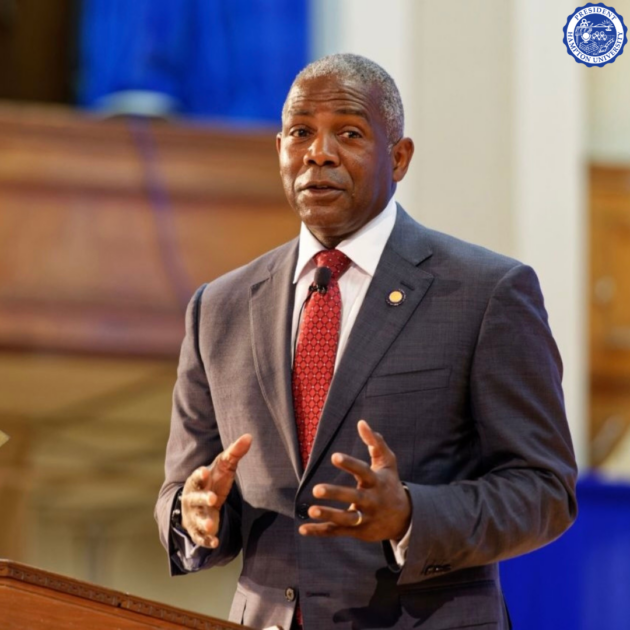OPINION: Leveling Up: Sustained Philanthropy and Access to Capital Markets Make HBCUs and our Nation Stronger
By: Hampton University President Darrell K. Williams

On behalf of Hampton University, I would like to offer my heartiest congratulations to President Helene Gayle, the Board of Trustees, and the entire Spelman College family on the recent historic $100 million donation, the largest ever gift to a historically Black college and university (HBCU) from billionaire couple Ronda Stryker and her husband, William Johnston. Stryker, the granddaughter of the founder of medical device maker Stryker Corp., and Johnson, the chairman of money management firm Greenleaf Trust, helped the institution make history, twice: celebrating 100 years of the institution’s official naming and forging a path for Spelman to become “need-blind,” referring to an admissions policy that does not consider an applicant’s financial status when deciding whether to accept them.
As a fellow institution in the community of 102 accredited Historically Black Colleges and Universities (HBCUs), we share their pride in this achievement. It inspires hope in the possibilities when philanthropy meets opportunity. This historic gift is a game-changing gesture for Spelman and our nation’s HBCUs. A gesture of this magnitude is an investment in the long-term financial sustainability of critical higher education institutions in America. This gift, hopefully, signals an elevated focus on lifting HBCUs to even greater heights and unlocking upward mobility for its graduates.
The donation is a testament to the power of philanthropy and the impact it can have on higher education. Philanthropy is an expression of values and a way of creating a legacy for future generations. It helps foster innovation, social equity, and community empowerment. As demonstrated powerfully by this generous gift to Spelman, philanthropy should be done with care, transparency, and humility. It should also be informed by research, evidence, and feedback from the beneficiaries and stakeholders.
The systemic, chronic underfunding of HBCUs is well-documented, and thankfully, we have witnessed several private philanthropic and federal funding efforts begin to address the gap. In 2019, McKenzie Scott signed the Giving Pledge, a nonbinding promise billionaires make to donate the majority of their wealth and donated $400 million to 17 HBCUs. In December 2020, Hampton University received $30 million to invest in urgent capital needs, our institutional endowment, and scholarships. Earlier this month, the Lilly Endowment, Inc. announced a $100 million gift to the United Negro College Fund, representing “the largest single unrestricted gift to the organization since its founding 80 years ago.” Further, and beyond mere philanthropy, the Biden administration awarded a consortium of HBCUs, led by Howard University, the first University Affiliated Research Center (UARC), a $90 million grant. We applaud these efforts and encourage America to level up to the proportion of its wealth. We challenge captains of industry and entrepreneurship to donate more robustly to our HBCUs and to create more game-changing opportunities to stabilize campuses and the surrounding communities where they were built.
Our HBCUs have a rich history dating back to the late 1800s, and our contributions to academic and cultural diversity are invaluable. However, they continue to punch well above their weight classes regarding return on investment. HBCUs equip Black students from various socioeconomic backgrounds with the skills they need to secure jobs, start businesses, invent new technologies, and more. In fact, roughly 10% of African Americans who attend college attend HBCUs, yet HBCUs award 15% of all bachelor’s degrees and 25% of STEM degrees. Over 40% of Black engineers, 50% of Black doctors and lawyers, and nearly 80% of Black judges received either an undergraduate or advanced degree – and in many cases both – from these exceptional schools.
Philanthropy can be a powerful force for good, but it requires responsibility, reflection, and sustained actions. Fostering a culture of philanthropy is instrumental in leveling up HBCUs, from addressing financial challenges and fostering academic excellence to supporting students and contributing to the overall growth and impact of these vital institutions. It is a powerful means of securing a brighter future for both the institutions and the diverse students they serve.
We all play a part in ensuring the next generation’s success and our institutions’ sustainability. Leveling up our HBCUs makes for a more robust academic landscape by producing successful graduates, fostering social and economic mobility, contributing to community development, preserving culturing heritage, and making notable contributions to research and innovation. Recognizing and supporting these institutions is essential to sustaining their positive impact on individuals and society. Leveling up our HBCUs is a step towards creating a more inclusive and equitable academic landscape that benefits us all.
